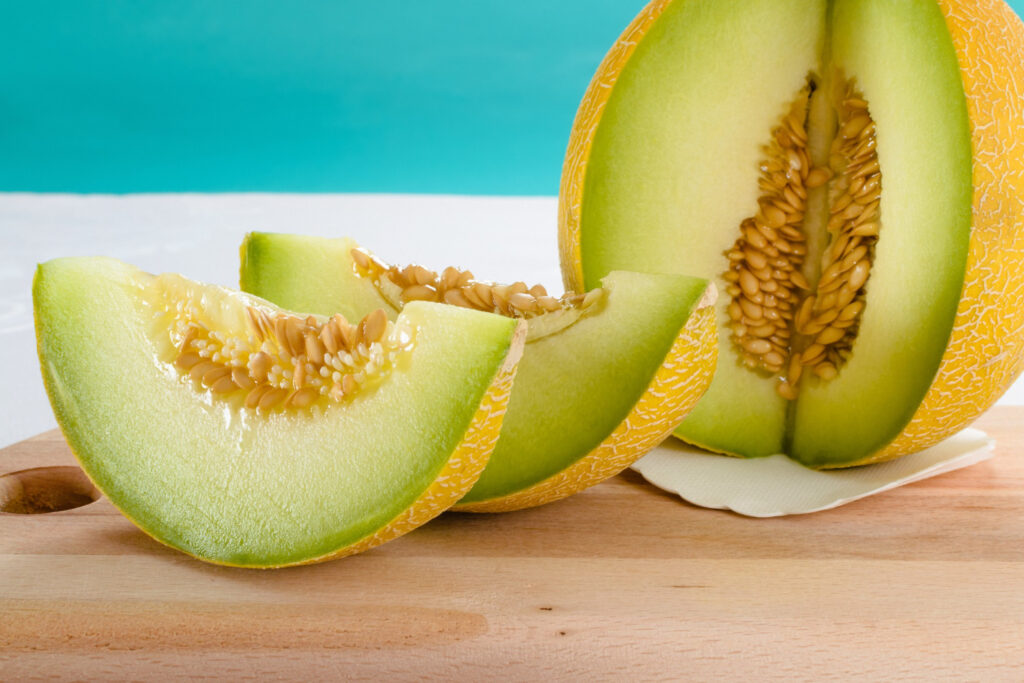
In this article
overview
Imagine biting into a juicy slice of honeydew melon on a hot summer day—its sweetness and refreshing taste instantly cooling you down. But did you know that this delicious fruit offers more than just a pleasant flavor? Honeydew melon is a nutritional powerhouse, providing a range of health benefits that might surprise you. Whether you’re looking to stay hydrated, support your immune system, or even improve your skin, honeydew melon can be an excellent addition to your diet.
Why Honeydew Melon Deserves a Spot in Your Diet
Honeydew melon is often overshadowed by its more colorful cousins, like watermelon and cantaloupe, but it holds its own as a nutritional gem. Typically in season from July to September, honeydew melons have a pale green flesh and a slightly firm texture. Their smooth, light green interior is encased in a rind that can range from pale yellow to creamy white. The fruit is related to other melons and gourds, such as squash and cucumbers, and shares many of their health benefits.
Loaded with water, vitamins, minerals, and antioxidants, honeydew melon is much more than just a sweet treat. It’s a versatile fruit that can be enjoyed in a variety of ways—from a simple snack to a refreshing addition to salads or smoothies. But beyond its culinary uses, honeydew melon offers significant health benefits, making it a valuable addition to a balanced diet.
Key Nutritional Benefits of Honeydew Melon
1. Hydration
One of the standout features of honeydew melon is its high water content—comprising about 90% water. This makes it an excellent fruit for staying hydrated, especially during the hot summer months. Just one cup of diced honeydew provides over five ounces of water, making it a tasty way to keep dehydration at bay.
Dehydration can lead to a host of issues, including headaches, kidney stones, and even impaired cognitive function. Regularly consuming water-rich foods like honeydew can help you maintain proper hydration levels, which in turn supports overall health and wellness.
2. Immune System Support
Honeydew melon is rich in vitamin C, a nutrient known for its immune-boosting properties. Just one cup of this fruit provides about a third of the daily recommended intake of vitamin C. This vitamin plays a crucial role in supporting the immune system by helping the body fight off infections and reducing the risk of chronic diseases.
Vitamin C also acts as an antioxidant, protecting cells from damage caused by free radicals. This protection is essential for reducing the risk of chronic conditions like heart disease and cancer. Since our bodies don’t store vitamin C, it’s important to include vitamin C-rich foods like honeydew in your daily diet to ensure your immune system functions optimally.
3. Blood Pressure Regulation
For those concerned about maintaining healthy blood pressure levels, honeydew melon can be a helpful ally. This fruit is naturally low in sodium and high in potassium—a combination that is known to support healthy blood pressure. Potassium helps the body expel excess sodium through urine, reducing strain on the cardiovascular system.
In addition to its potassium content, honeydew melon may also support the production of nitric oxide, a molecule that helps relax blood vessels and improve blood flow. This effect can further help in managing and preventing high blood pressure.
4. Blood Sugar Control and Diabetes Prevention
Honeydew melon’s fiber content, although modest compared to other fruits, plays a role in regulating blood sugar levels. Fiber slows the absorption of sugar into the bloodstream, which helps prevent spikes in blood sugar—a crucial benefit for those managing diabetes or looking to prevent it.
Research suggests that consuming fruits like honeydew can also improve insulin sensitivity, which is the body’s ability to effectively use insulin to manage blood sugar levels. A diet rich in fruits and vegetables, including honeydew, is associated with a lower risk of developing type 2 diabetes and its complications.
5. Digestive Health Boost
If you struggle with digestive issues, honeydew melon might offer some relief. Its high water content, combined with a small amount of dietary fiber, makes it beneficial for digestive health. The fiber in honeydew helps to keep the digestive system running smoothly, promoting regular bowel movements and preventing constipation.
Honeydew is also gentle on the digestive system, making it a good choice for those with certain digestive disorders who may need to reintroduce fiber into their diets gradually.
6. Bone Health Enhancement
Honeydew melon contains a variety of nutrients that support bone health, including vitamin K, folate, and magnesium. These nutrients are essential for maintaining bone density and preventing conditions like osteoporosis.
Vitamin K, in particular, helps in the production of osteocalcin, a protein that strengthens bones by binding calcium. Folate, on the other hand, assists in breaking down homocysteine, a compound that can weaken bone structure when present in high levels. Regular consumption of honeydew can contribute to stronger, healthier bones over time.
7. Skin Health Savior
Your skin’s health may benefit greatly from the regular inclusion of honeydew melon in your diet. The fruit’s high vitamin C content supports collagen production—a protein that keeps skin firm and youthful. Vitamin C also helps protect the skin from sun damage and environmental pollutants, which can lead to premature aging.
In addition to its vitamin C content, the high water content of honeydew melon helps keep your skin hydrated, contributing to a healthy, glowing complexion. Regularly eating honeydew may improve skin elasticity, tone, and overall appearance
Adding Honeydew Melon to Your Diet
Incorporating honeydew melon into your diet is easy and enjoyable. Here are some creative ways to enjoy this nutrient-rich fruit:
- Simple Snack: Slice it open, remove the seeds, and enjoy the juicy flesh straight from the rind.
- Fruit Salad: Combine honeydew with other fruits like berries, mangoes, and pineapples for a refreshing salad.
- Smoothies: Blend honeydew with yogurt, spinach, and a banana for a hydrating and nutritious smoothie.
- Spa Water: Add chunks of honeydew to your water bottle with a few sprigs of mint for a refreshing spa-like experience.
- Frozen Treats: Puree honeydew and freeze it into popsicle molds for a healthy, all-natural treat.
The Takeaway
Honeydew melon is more than just a sweet and refreshing summer fruit—it’s a nutritional powerhouse that can contribute to better health in numerous ways. From keeping you hydrated to supporting your immune system, regulating blood pressure, and even enhancing skin and bone health, honeydew melon offers a wide array of benefits that make it worth adding to your diet.
So, the next time you’re at the market, don’t overlook this pale green gem. Whether you enjoy it on its own or incorporate it into a variety of dishes, honeydew melon can be a delicious and nutritious part of your healthy lifestyle. Take a step toward better health today by savoring the sweet, hydrating goodness of honeydew melon
A Quick Review
Honeydew melon, often overlooked in favor of more colorful fruits, is a refreshing and nutrient-rich addition to any diet. Packed with water, vitamins, and antioxidants, this fruit supports hydration, immune function, blood pressure regulation, and even skin health. Its subtle sweetness and versatility make it perfect for everything from snacks to smoothies. Adding honeydew to your diet not only satisfies your taste buds but also contributes to overall well-being.
FAQs About Honeydew Melon
1. What is honeydew melon?
Honeydew melon is a sweet, pale green fruit known for its high water content and refreshing taste.
2. What are the health benefits of honeydew melon?
Honeydew melon supports hydration, boosts the immune system, regulates blood pressure, and promotes healthy skin and digestion.
3. How does honeydew melon help with hydration?
Honeydew melon is composed of about 90% water, making it an excellent fruit for staying hydrated.
4. Is honeydew melon good for skin health?
Yes, honeydew melon is rich in vitamin C, which supports collagen production and helps maintain skin elasticity and youthfulness.
5. Can honeydew melon help regulate blood pressure?
Yes, honeydew melon is high in potassium, which helps manage blood pressure by balancing sodium levels in the body.
6. How can I incorporate honeydew melon into my diet?
You can enjoy honeydew melon as a snack, in fruit salads, blended into smoothies, or even frozen as a treat.
7. Is honeydew melon safe for people with diabetes?
Honeydew melon has fiber that helps regulate blood sugar levels, making it a suitable fruit choice for people with diabetes when consumed in moderation.
8. What nutrients are found in honeydew melon?
Honeydew melon is rich in vitamin C, potassium, vitamin K, folate, and magnesium, all of which contribute to various health benefits.











